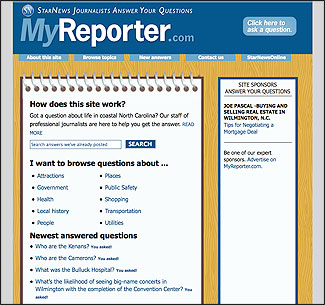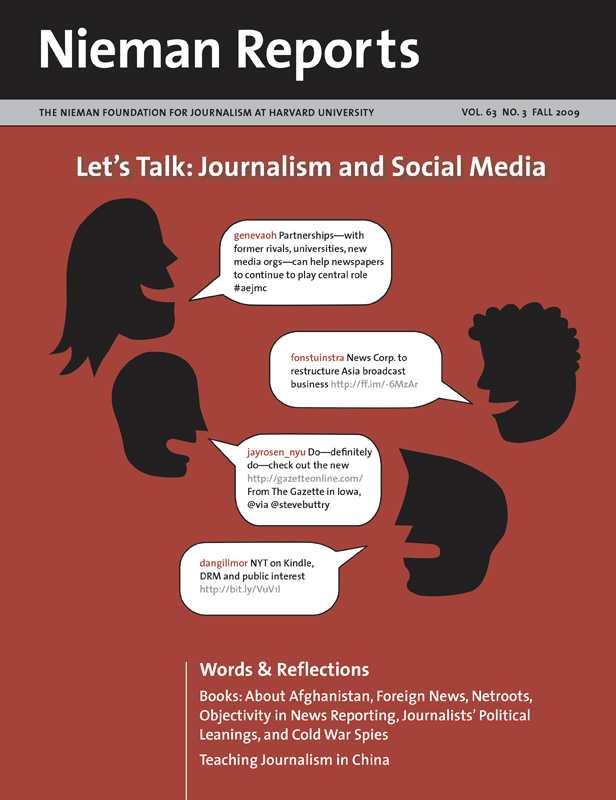All good journalism starts with a question. But, who’s doing the asking?
In most newsrooms, it’s not the reader. If the reader has input, it’s usually a reaction to what already has been reported. Of course, some stories originate from a reader’s call, but most of the time the reporter and editor drive the decisions about what gets covered and the questions asked in doing so.
MyReporter.com, launched in mid-2009, turns that dynamic on its head. Now, readers are in control at the start of the process. It works like this: Ask a question, either on our Web site, via e-mail, or by Twitter. Within 24 hours (longer on weekends and holidays), a personal response will come from our newsroom describing how we plan to handle the question. While we don’t commit to answering questions that are too specific to a single person’s situation or ones seeking to resolve disputes, we’ll at least direct the person who asked to possible resources. Questions we do answer are assigned to staff reporters, who provide a timely response that we post on the site, with credit given to the person who raised the question.
This idea grew out of a discussion StarNews Executive Editor Robyn Tomlin led about how we could innovate. Like many newspapers, we use tools such as Twitter and online forums to communicate with readers. In listening to our readers, we often heard them ask questions like “What were all those sirens I just heard downtown?,” or “Who can I complain to about my neighbor’s trashy yard?.” With this in mind, Tomlin challenged us: How could our newsroom provide a “help desk” for our community?
Our conversation took place on a Thursday. That weekend, the idea took form in my head. I sketched out a rough mock-up and drew up a proposal for what is now MyReporter.com. During the next few months, I built the site by customizing the WordPress blog platform. We launched it with about 300 staff-originated items, followed by readers’ questions and our answers. Once they are displayed on the front of the site, all of these Q & A’s are then archived. This is the second function of MyReporter.com: to become a growing, eclectic, Wiki-like reference for our community.
The concept was new for us and for the community. We weren’t sure how people would take to it or whether they’d even figure out how to use it. With an unexpectedly high volume of questions submitted early on, it turned out to be a positive reception. In our first two weeks, we received about 60 questions, ranging from “How do I find out who’s responsible for cleaning and maintaining local roadside ditches?,” to “Should I get someone to urinate on me if I have a jellyfish sting?.” A number of questions played off news coverage or led to new stories. For example, North Carolina recently strengthened public smoking laws as they apply to businesses such as restaurants. A question from one reader about how the changes applied to hookah bars resulted in a story pointing out that they likely would be shut down.

In an effort to provide a sort of help desk for the community, the StarNews of Wilmington, North Carolina, launched MyReporter.com earlier this year. The site invites readers to submit questions, which are then answered by staff reporters.
Paying for MyReporter.com
Our volume of questions has grown steadily to about 75 each week, about two-thirds of which result in new answers on MyReporter.com. This development, while immensely gratifying, has weighed on the editorial staff. We’ve assigned the equivalent of about one and one-half full-time journalists to this site, without adding to our staff. Since MyReporter.com is now one of our Web site’s more popular features, we are committed to making it sustainable by finding ways to have it earn revenue.
MyReporter.com’s success rests, in large part, on the quality of answers that result from using professional reporters and editors. We don’t want to dilute that, but also we want to preserve our core function of reporting and writing the daily news along with producing enterprise and investigative pieces. Right now, we’re using a variety of approaches to balance these seemingly competing priorities, including being more selective about the questions we answer and looking for new resources, such as local experts, to help in our efforts to respond.
Readers have embraced MyReporter.com. Even in its first month, MyReporter.com ranked among our site’s most-viewed categories. We’d receive messages such as “No question today, but just a comment that I think this feature is excellent,” and “the Web site is the greatest. My father and I spent hours last night reading it.” Through questions they ask and their use of MyReporter.com, readers tell us—and the rest of the community—what they want to know more about. With their excellent questions, they prompt us to provide content that will measure up; the information sharing that is a part of these exchanges sometimes ends up being reverse-published in the paper.
But MyReporter.com has also become a tool that we’re using to shape our overall coverage. It’s led us, for example, to focus more of our newsroom resources on stories about transportation and development issues. MyReporter.com provides us with a real-time window into our community’s curiosity about our region’s culture, history and events. It’s one we wouldn’t have without them, and this might well turn out to be its greatest value.
Vaughn Hagerty is the Web development manager at the StarNews in Wilmington, North Carolina, and the creator of MyReporter.com, which won the 2009 Knight-Batten Citizen Media Award.
In most newsrooms, it’s not the reader. If the reader has input, it’s usually a reaction to what already has been reported. Of course, some stories originate from a reader’s call, but most of the time the reporter and editor drive the decisions about what gets covered and the questions asked in doing so.
MyReporter.com, launched in mid-2009, turns that dynamic on its head. Now, readers are in control at the start of the process. It works like this: Ask a question, either on our Web site, via e-mail, or by Twitter. Within 24 hours (longer on weekends and holidays), a personal response will come from our newsroom describing how we plan to handle the question. While we don’t commit to answering questions that are too specific to a single person’s situation or ones seeking to resolve disputes, we’ll at least direct the person who asked to possible resources. Questions we do answer are assigned to staff reporters, who provide a timely response that we post on the site, with credit given to the person who raised the question.
This idea grew out of a discussion StarNews Executive Editor Robyn Tomlin led about how we could innovate. Like many newspapers, we use tools such as Twitter and online forums to communicate with readers. In listening to our readers, we often heard them ask questions like “What were all those sirens I just heard downtown?,” or “Who can I complain to about my neighbor’s trashy yard?.” With this in mind, Tomlin challenged us: How could our newsroom provide a “help desk” for our community?
Our conversation took place on a Thursday. That weekend, the idea took form in my head. I sketched out a rough mock-up and drew up a proposal for what is now MyReporter.com. During the next few months, I built the site by customizing the WordPress blog platform. We launched it with about 300 staff-originated items, followed by readers’ questions and our answers. Once they are displayed on the front of the site, all of these Q & A’s are then archived. This is the second function of MyReporter.com: to become a growing, eclectic, Wiki-like reference for our community.
The concept was new for us and for the community. We weren’t sure how people would take to it or whether they’d even figure out how to use it. With an unexpectedly high volume of questions submitted early on, it turned out to be a positive reception. In our first two weeks, we received about 60 questions, ranging from “How do I find out who’s responsible for cleaning and maintaining local roadside ditches?,” to “Should I get someone to urinate on me if I have a jellyfish sting?.” A number of questions played off news coverage or led to new stories. For example, North Carolina recently strengthened public smoking laws as they apply to businesses such as restaurants. A question from one reader about how the changes applied to hookah bars resulted in a story pointing out that they likely would be shut down.

In an effort to provide a sort of help desk for the community, the StarNews of Wilmington, North Carolina, launched MyReporter.com earlier this year. The site invites readers to submit questions, which are then answered by staff reporters.
Paying for MyReporter.com
Our volume of questions has grown steadily to about 75 each week, about two-thirds of which result in new answers on MyReporter.com. This development, while immensely gratifying, has weighed on the editorial staff. We’ve assigned the equivalent of about one and one-half full-time journalists to this site, without adding to our staff. Since MyReporter.com is now one of our Web site’s more popular features, we are committed to making it sustainable by finding ways to have it earn revenue.
MyReporter.com’s success rests, in large part, on the quality of answers that result from using professional reporters and editors. We don’t want to dilute that, but also we want to preserve our core function of reporting and writing the daily news along with producing enterprise and investigative pieces. Right now, we’re using a variety of approaches to balance these seemingly competing priorities, including being more selective about the questions we answer and looking for new resources, such as local experts, to help in our efforts to respond.
Readers have embraced MyReporter.com. Even in its first month, MyReporter.com ranked among our site’s most-viewed categories. We’d receive messages such as “No question today, but just a comment that I think this feature is excellent,” and “the Web site is the greatest. My father and I spent hours last night reading it.” Through questions they ask and their use of MyReporter.com, readers tell us—and the rest of the community—what they want to know more about. With their excellent questions, they prompt us to provide content that will measure up; the information sharing that is a part of these exchanges sometimes ends up being reverse-published in the paper.
But MyReporter.com has also become a tool that we’re using to shape our overall coverage. It’s led us, for example, to focus more of our newsroom resources on stories about transportation and development issues. MyReporter.com provides us with a real-time window into our community’s curiosity about our region’s culture, history and events. It’s one we wouldn’t have without them, and this might well turn out to be its greatest value.
Vaughn Hagerty is the Web development manager at the StarNews in Wilmington, North Carolina, and the creator of MyReporter.com, which won the 2009 Knight-Batten Citizen Media Award.



